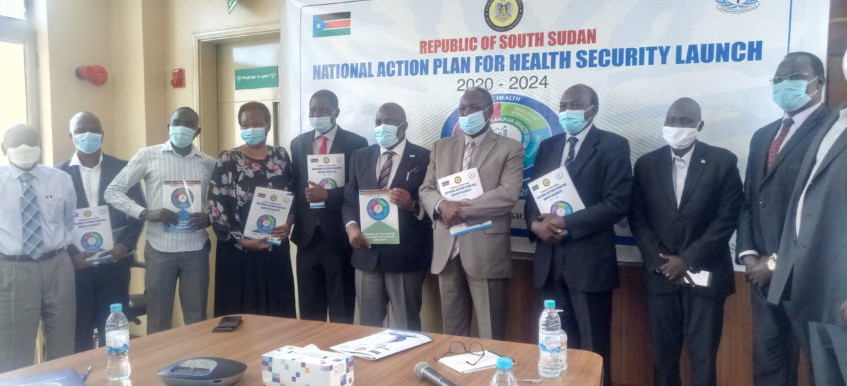South Sudan’s cabinet affairs minister, Dr. Martin Elia Lomuro, has admitted that the health care system in the country has been neglected, saying this has been exposed by the Covid-19 pandemic.
The country is currently battling the coronavirus pandemic and new cases of polio recorded recently in Warrap, Western Bahr el Ghazal, Northern Bahr el Ghazal, and Lakes states.
The country is also prone to diseases, with meningitis, measles, yellow fever, and whooping cough endemic for many areas.
Many health agencies say preventable diseases such as malaria and acute respiratory infections are the leading causes of death in the country, coupled with river blindness, sleeping sickness, and cholera.
Speaking during the launch of the National Action Plan for Health Security 2020 –2024 last week in Juba, cabinet affairs minister, Martin Elia Lomuro, said the health facilities are an embarrassment to the country.
“It is a national challenge. No country gives its health to be looked after by somebody else. It is just like giving your family to be looked after by a neighbor. I have been very keen monitoring our health infrastructure, our health, human resources, and our level of preparedness, our level of response, ability to detect and prevent,” Elia said. “To think about it makes me sick because you don’t know what can hit you anytime. Covid-19 has exposed us very seriously, I lost two friends within minutes.”
“So I take issues to do with health very seriously because we have become a laughing stock. Everywhere in our health system, you go to this hospital and you see wrong things happening. There is no pride, they don’t feel confident, so if you become sick and you are taken to the hospital, the first thing that comes to your mind is that there is a 90% chance that you will die,” the minister lamented.
The undersecretary at the health ministry, Mayen Machut, promised that despite all these challenges, the institution is working to improve the sector.
"In this country, we have some healthcare but it is not defined for the last fifteen years we have been doing it as we go, as ‘do it yourself’ healthcare. A lot of good work has been done, one of them is we are going to get the support we need to establish the system,” Machut said. “The whole world has got a system and this is what we are fighting for.”
“What we are embarking on today is called risk management and these risks are natural disasters and we have flooding, insecurity and political upheavals and outbreak of infectious diseases that are imported from across borders, we need to be cautious of them. Risk management is a central issue and health care becomes a security issue for the nation,” Machut added.
The implementation of the 85 page National Action Plan for Health Security is expected to cost about 70 million US dollars.
South Sudan has a health system structured with three tiers: Primary Health Care Units PHCU, Primary Health Care Centers PHCC, and Hospitals which exist as either state, county, police, or military facilities.
According to the World Health Organization (WHO), South Sudan faces a severe shortage of trained health professionals, including physicians and midwives, low and irregularly paid wages, and a lack of supervision at all levels.




